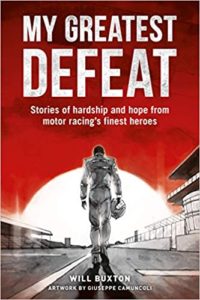Alex Zanardi is a living legend. Born in Italy in 1966, Zanardi grew up racing. His Formula 1 debut took place at the 1991 Spanish Grand Prix. After modest success in Europe, he came to America in 1995 and began working for Champ Car. Zinardi enjoyed instant success and became one of the most popular drivers in America.
Tragedy Strikes
In 2001 while exiting pit row at the Lausitzring in Germany, he lost control of his car and slid into the path of an oncoming racer. As a result of the crash, Zanardi lost both legs and approximately three-quarters of the blood in his body. It was a true miracle he survived.
But for Alex Zanardi, all the success and tragedy he had experienced up to this point was simply creating the platform for what he would do next.
A New Journey Begins
As an engineer and mechanic, he would begin working with his prosthetic team to design his own legs. As he said in Will Buxton’s excellent book My Greatest Defeat: Stories of hardship and hope from motor racing’s finest heroes, “The functionality of a mechanical knee joint on a prosthetic leg and the similarities it had to the mechanism of the suspension of a race car started this new passion for me.”
He has since returned to auto racing on a limited basis with a specially designed BMW. But it was handcycling where Zanardi would achieve ultimate success and global attention. He has won the Venice, Rome, and New York City Marathons. In the 2012 Paralympic Games, Zanarid won two gold medals and a silver. But he wasn’t finished. In the 2016 Paralympics, Zanardi won two more gold medals and another silver. In the World Championships, Zanardi is an eight-time gold medal winner and added two silvers.
And he is still racing cars and handcycles. So let the medal count continue!
Lessons Learned
I recommend purchasing Burton’s book if for no other reason than the chapter on Alex Zanardi. You can do so by clicking HERE or on the image provided. So what is his message for leaders? I think it is best summed up by what Zanardi chooses to focus on.
Zanardi said, “The path to creating the conditions that enable you to actually sit in a car and deliver should be the most important part. The most desirable aspect of it all is the journey, not simply crossing the line ahead of everybody else. It is the journey that should interest you and make it fascinating for you. It should be the executing the project, rather than cashing in on the result.”
He later adds, “If I think back it was such an enjoyable time of my life, preparing for something like this, not knowing that crossing that (finish) line would have also granted me the glory I had, which was a great reward. But I was not expecting that. It was an added value. The real value was all the time I spent in the wooden shed I have in my garden where I keep all my stuff, training on my bicycle and then whenever I had nothing else to do, lying next to my bicycle looking at it and asking myself how I could make it better and how I could couple it more with my residual talent.”
So what should leaders be focused on this week?
Focus on the process. Focus on getting better. Focus on getting a great team around you. Focus on your character. Focus on executing the project. Focus on making marginal gains every day. Focus on complementing your natural talent. Focus on the journey.
So what should leaders NOT be focused on this week?
The results which is only the residue of the eight items mentioned above. The rewards which are only added value.
What are you choosing to focus on this week?
The Top 100 Leadership Quotes From 2020 is my latest ebook. The wisdom contained in these pages from top business leaders, pastors, coaches, and superlative thinkers sustained countless leaders in the most turbulent year anyone can remember. If you want to be the best leader you can possibly be, click HERE or on the image provided to download this FREE resource. The lessons learned from last year, if applied, will sustain you for years to come.


